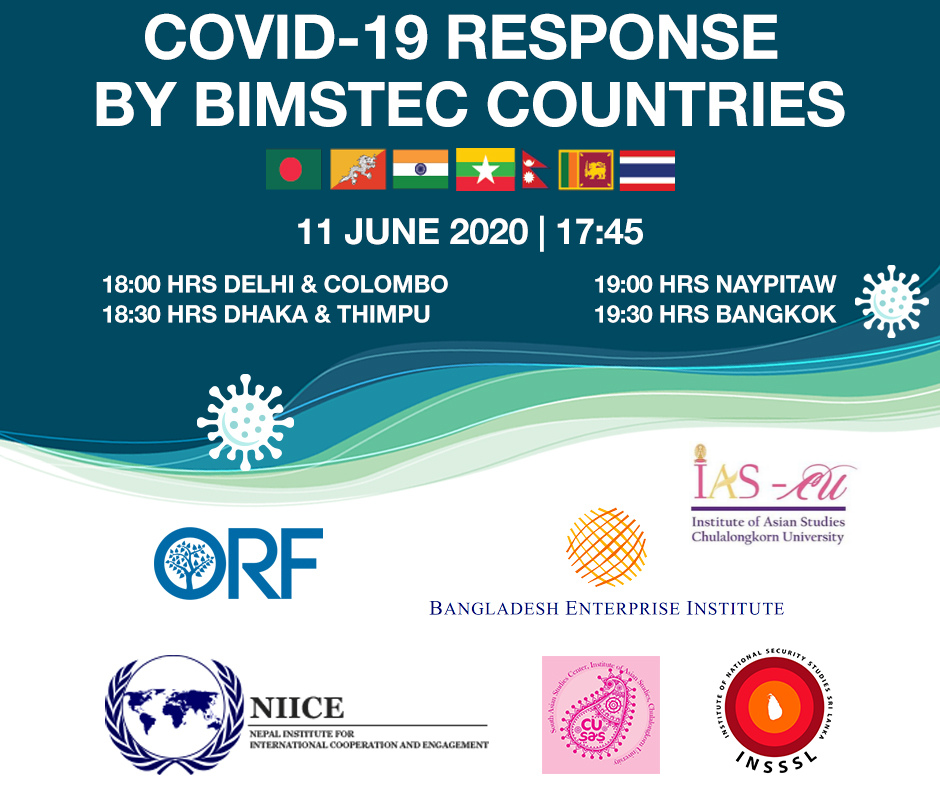
COVID-19 Response by BIMSTEC Countries
Watch it on NIICE Nepal YouTube Channel
Event Report
Nepal Institute for International Cooperation and Engagement (NIICE) in collaboration with Observer Research Foundation, New Delhi, Bangladesh Enterprise Institute, Dhaka, Institute of National Security Studies Sri Lanka, Colombo and South Asian Studies Center, Institute of Asian Studies, Chulalongkorn University, Bangkok is organizing discussion on COVID-19 Response by Bay of Bengal Initiative for Multi-Sectoral Technical and Economic Cooperation (BIMSTEC) Countries on 11 June 2020.
The event was chaired by Dr. Pramod Jaiswal; Research Director, Nepal Institute for International Cooperation and Engagement. Other panelists included Prof. Shahab E. Khan; Research Director, Bangladesh Enterprise Institute (BEI), Prof. Jirayudh Sinthuphan, Director of South Asian Studies Centre, Chulalongkorn University, and Ms. Ruwanthi Jayasekara, Research Assistant at Institute of National Security Studies Sri Lanka (INSSSL). The panelists introduced the Bay of Bengal Initiative for Multisectoral Technical and Economic Cooperation (BIMSTEC), which comprises five countries from South Asia (Bangladesh, Bhutan, India, Nepal, and Sri Lanka) and two countries from Southeast Asia (Myanmar and Thailand). It is often seen as a link between these two regions and their respective regional institutions: the South Asian Association for Regional Cooperation (SAARC) and the Association of Southeast Asian Nations (ASEAN). The fight against COVID-19 in Sri Lanka has been successful, according to Ms. Ruwanthi Jayasekara. “Pandemic has made us appreciate the resources and potential that Sri Lanka holds, which was not realized until we were forced to live with them,” the speaker said.
The regional economy must be enhanced through potential channels of collaboration in the fields of blue economy, air connectivity, and agriculture because the fall of economies poses both short - and long-term challenges. Other panelists discussed the responses made by each nation and the requirement for the BIMSTEC nations to develop a substantial response to the epidemic. Dr. Sinthuphan emphasized the significance of developing a stronger healthcare system in the area that would integrate conventional and modern medicine. It was highlighted that the BIMSTEC countries’ population differs from that of other areas. India plays a crucial role in bolstering the organization because it serves as the region’s primary source of internet security. The over-reliance on countries outside the region will decrease with better and more successful regional integration. It was noted that Countries in this region have been deeply affected by the ongoing coronavirus pandemic. Regional integration can lead to substantial economic gains for the Bay of Bengal region, particularly in the post-COVID-19 period. However, the benefits of regionalism will likely depend on the spirit the Bay of Bengal countries bring to the integration effort.
Prepared by Anjali Yadav, Intern at NIICE, Nepal

Recent Comments